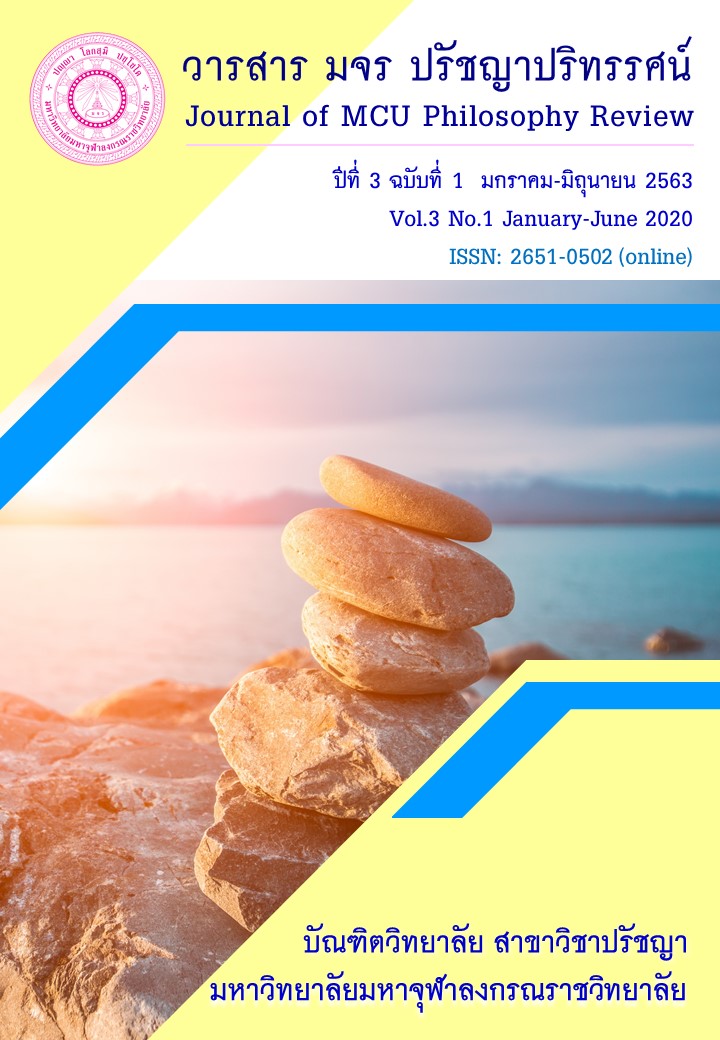Ethics of living together in society
Main Article Content
Abstract
Society is to live together in large numbers. Sociology studies whole society in order to see the structure, work and various social relations, such as institutions, classes, social groups, status, norm, order, balance of society. It takes into account the coexistence of humans and society, necessarily considering morality and ethics for living in society for social peace. In the Buddha’s time, social, economic and political evolution were found by agreeing to allocate land to make a living and select the governing body, the King will perform as ruler, Brahamans were leader of religious function, specific works were under supervision of Vasiya and Sudra worked as lower labor. Ethics is virtuous and correct guideline of behavior of both physically and mentally helping the life to live harmonizingly, successfully in work, with discipline, responsibility to duties. There are 2 principles of worldly life; Gharavasadhamma or lay’s virtues and Sangahavatthu 4 or public responsibility. The first virtue guidelines the success of lay life including; Truthfulness, Taming and training oneself, tolerance and generosity. The second virtue consists of giving, kindly speech, useful conduct and equal treatment aims to enable people in the society, small and large organizations live happily together and fostering unity.
Article Details
บทความที่ได้รับการตีพิมพ์เป็นลิขสิทธิ์ของวารสาร มจร ปรัชญาปริทรรศน์
ข้อความในบทความที่ได้รับการตีพิมพ์ในวารสาร ถือเป็นความรับผิดชอบของผู้เขียนบทความ และข้อคิดเห็นนั้นไม่ถือว่าเป็นทัศนะและความรับผิดชอบของกองบรรณาธิการวารสาร มจร ปรัชญาปริทรรศน์
References
พระพรหมณ์ คุณาภรณ์ (ป.อ. ปยุตฺโต). (2557). พจนานุกรมพุทธศาสน์ ฉบับประมวลศัพท์. กรุงเทพมหานคร: โรงพิมพ์มหาจุฬาลงกรณราชวิทยาลัย
พายุ ภูคำวงศ์. (2558).“การปรับใช้หลักพุทธจริยาเพื่อพัฒนาผู้บริหารสถานศึกษาขนาดเล็กให้มีประสิทธิภาพในการทำงาน”. บทความวิจัย งานสัมมนาวิชาการระดับชาติ ประจำปีการศึกษา 2558. บัณฑิตวิทยาลัย: มหาวิทยาลัยมหาจุฬาลงการณราชวิทยาลัย.
มหาจุฬาลงกรณราชวิทยาลัย. (2539). พระไตรปิฎกภาษาไทย ฉบับมหาจุฬาลงกรณราชวิทยาลัย. กรุงเทพมหานคร: โรงพิมพ์มหาจุฬาลงกรณราชวิทยาลัย, 2539.
มหาจุฬาลงกรณราชวิทยาลัย. (2553). อรรถกถาภาษาไทย. กรุงเทพมหานคร: โรงพิมพ์มหาจุฬาลงกรณราชวิทยาลัย.
ยุบลวรรณ ตั่นเธียรัตน์. (2557). มนุษย์กับสังคม. พิมพ์ครั้งที่ 15. กรุงเทพมหานคร: สำนักพิมพ์มหาวิทยาลัยกรุงเทพ.
สมบัติ รัตนนคร. (2558). “หลักสูตรการพัฒนาคุณธรรมสำหรับผู้บริหารโรงเรียนมัธยมศึกษาสังกัดสำนักงานเขตพื้นที่การศึกษามัธยมศึกษาเขต 6”. บทความวิจัย งานสัมมนาวิชาการระดับชาติ ประจำปีการศึกษา 2558. บัณฑิตวิทยาลัย: มหาวิทยาลัยมหาจุฬาลงกรณราชวิทยาลัย.


